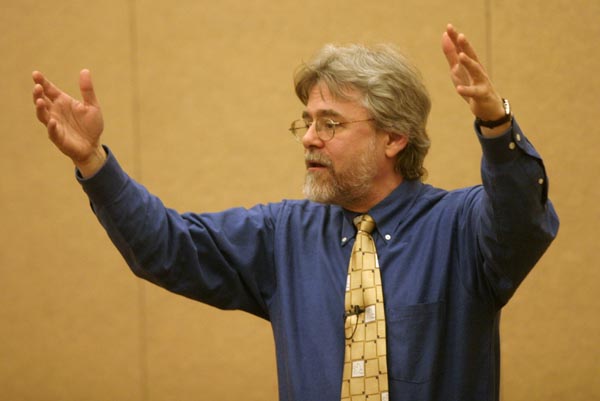excerpt of Fabric of Faithfulness
Dr. Garber, as expected, was excellent as he offered gentle and wise guidance on being responsible with what one knows. Using resources as diverse as Walker Percy and Simone Weil, Wendell Berry and Bono, Tom Shadyac (Patch Adams, Bruce Almighty), Thomas Wolfe, and Abraham Kuyper, he invited us to consider deep ways to relate faith and life, ethical living with the meaning of our vision for life. As we had hoped, participants not only purchased books from our display on developing a Christian world and life view (see the list we shared as posted at our October website column) but a few bought novels and poems by Wendell Berry. Hard work lugging it all over there, but a nice, nice feeling afterwards...
Below is a quote from Fabric of Faithfulness which I cited in my opening meditation. (I also read the first chapter of early elementary kid's book Junie B. Jones Is Not A Crook, about her lovely mittens, too, but that is a another story.) The Garber paragraph was a good choice to read to the group--thanks, God!--since much of the day really seemed to come back to this very theme, over and over again. How does one maintain deep commitments and loves over the course of a lifetime? How can we truly be sons and daughters of Issachar--who understand and do? How does one maintain integrity and care about the world in an info-glut age (AIDS in Africa, 9-11, tsunamis, Katrina and on and on and on) without falling into either jaded cynicism or overwhelming sorrow? How does one keep one's heart from becoming like that which Jesus told about in the story of the four soils, whose commitment to the truth is strangled by the many cares and riches of this world? Here's Garber:
How is it possible to see into the meaning of one's moment in history and to act responsibly, rather than be overwhelmed by either cynicism or sorrow because the brokenness seems so deep, the pain so profound? In a certain sense, everything we do as human beings is rooted in that question. Decisions we make within families either nourish or destroy our connectedness. Choices we make about our vocations lead to deeper commitments or greater dissatisfaction. Attitudes we nurture about common good responsibilities cause us to either be more fully engaged or to retreat into the sphere of those who do not care. Day by day we are forming characters and forming cultures in the way we respond to the world around. If we are to avoid the paralysis of destructive cynicism and debilitating sorrow, somehow, somewhere, we have to make sense of the world--not only of our own lives, but of life.Another helpful way into the themes which Steve guided us through is to read his excellent essay, Learning to Love What God Loves a printed copy of which was passed out to participants. By reading it, you, too, can join our learning community as we ponder this together. It is well, well worth reading. Also, a very good summary of much of what Steve is talking about these days can be found in his wonderful sermon entitled Learning to See What You See: On Liturgy, Learning and Life which is in Get Up Off Your Knees: Preaching the U2 Catalogue, another book we blogged about in our last post. Steve, as we said, has two chapters in there. As the aforementioned pre-schooler Junie B. Jones might say, "It fills me with glee, that's why."
By the way, does anybody want to suggest what my three Y-words from the last post had to do with Garber's Fabric of Faithfulness book? Yada, Yoda, and the Ya-Yas? How about if we offer a prize? Yeah, a prize. We will give a 25% off your next ordered book to the first person to tell us what the heck I'm talking about---Yada, Yoda and the Ya-Yas? And Fabric...? Come on, who wants to explain...
Fabric of Faithfulness: Weaving Together Belief and Behavior in the University Years Steven Garber (IVP) $14.00





<< Home